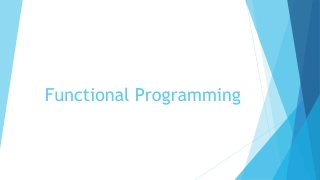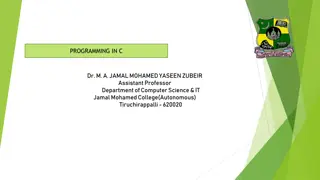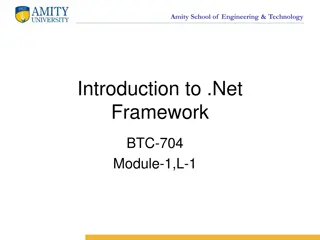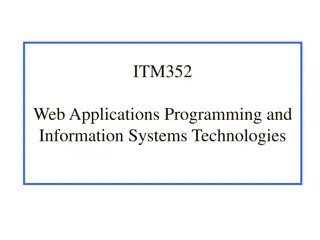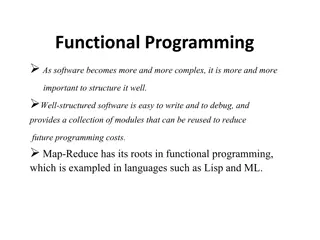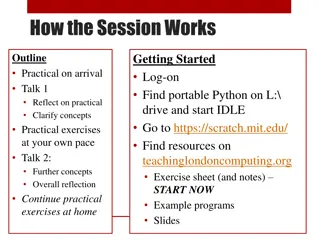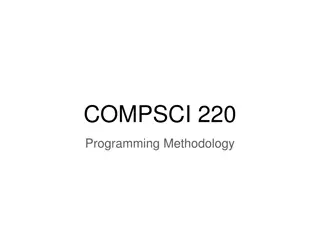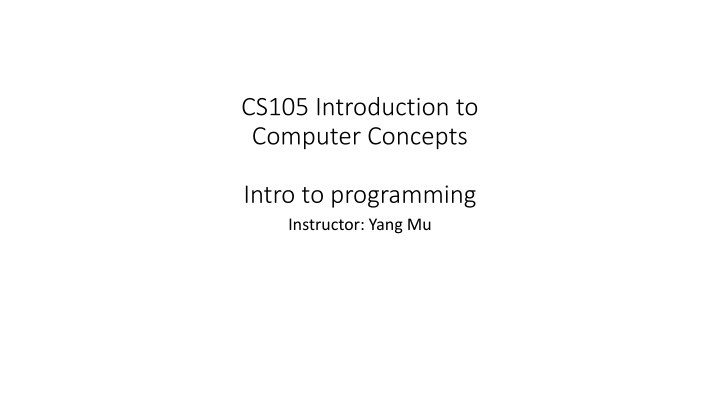
Programming Languages and Their Generations
Explore the evolution of programming languages from machine language to high-level languages like COBOL, FORTRAN, and more. Learn about different generations of programming languages and their characteristics, including readability, write efficiency, and execute efficiency. Discover how each generation has contributed to making programming more accessible and efficient.
Uploaded on | 3 Views
Download Presentation

Please find below an Image/Link to download the presentation.
The content on the website is provided AS IS for your information and personal use only. It may not be sold, licensed, or shared on other websites without obtaining consent from the author. If you encounter any issues during the download, it is possible that the publisher has removed the file from their server.
You are allowed to download the files provided on this website for personal or commercial use, subject to the condition that they are used lawfully. All files are the property of their respective owners.
The content on the website is provided AS IS for your information and personal use only. It may not be sold, licensed, or shared on other websites without obtaining consent from the author.
E N D
Presentation Transcript
CS105 Introduction to Computer Concepts Intro to programming Instructor: Yang Mu
Outline Programming Languages History Implementation Algorithm Design Problem Solving Pseudocode 3/21/2025 3
Programming Language First-generation: Machine language Second-generation: Assembly language Third-generation: High-level language Fourth-generation (Fifth-generation) 3/21/2025 4
Three properties of programming language Readability Write efficiency Execute efficiency
1GL: Machine language A set of primitive instructions built into every computer The instructions are in the form of binary code 1101101010011010 Computers can run instructions only in machine language! Machine code is represented using bytes. It is tedious to read and write. Each family of processor (x86, ARM) understands different machine languages. 3/21/2025 7
2GL: Assembly language Low-level programming language to represent machine-language instructions E.g.: ADDF3 R1, R2, R3 Assembly code need to be converted into machine code by using an assembler Assembly program is platform dependent Combination of mnemonic and machine instruction Every assembly language instruction has a direct analogue in the form of a machine language instruction. Still difficult to write, but at least readable. Still processor-family specific, since it is directly associated with a machine language. Only used to program when absolutely necessary. 3/21/2025 8
3GL: High-level language English-like and easy to learn and program. E.g.: Area = 5 * 5 * 3.1415; COBOL, FORTRAN, BASIC, Pascal, Ada, C, Visual Basic, Delphi, C++, C#, Java Source program is compiled into machine code by a compiler and linked to supporting library code by a linker to form an executable file. 3/21/2025 9
4GL / 5GL 3GL offered greater power to the programmer, while 4GL open up the development environment to a wider population. (Applications Development Without Programmers) Database query languages: SQL Data manipulation, analysis, and reporting languages: MATLAB, SPSS 3/21/2025 10
Category (3GL) Windows Application C, C++, Java, Visual Basic, C# Web Application Server Side PHP, JSP (Java), ASP.NET (Visual Basic, C#), Client Side JaveScript, VBScript 3/21/2025 11
The Binary Machine A modern computer can run programs written in JavaScript, Pascal, Visual Basic, Visual C++, etc. However, computers can only understand one language: the machine language it is not easy to use. The machine language of a Sun workstation is different from a PC (or other platform), however, they can run the same C++ program. 3/21/2025 12
Two types of Translators (3GL to 1GL) Translators Interpreter: translate and run the source code one line at a time. Easy to write and easy to find the errors in the program, but running very slow. crossplatform JavaScript, VBScript, Java, Python, PHP, Compiler: translates the source code once and for all, producing a complete machine language program. Very fast, but when the program fails, difficult to show the programmer where are the errors. C, C++, C#, and so on. 3/21/2025 13
Implement a Language Generally, the action of any translating program can be divided into three phases Scanning Parsing Code generation 3/21/2025 14
Implement a Language - Scanning Scanning process: a long string of characters is broken into tokens. Example: sum = a + b is broken into 5 tokens sum, =, a, +, b A token is the smallest meaningful unit of information. 3/21/2025 15
Implement a Language - Parsing Parsing: the string of tokens is transformed into a syntactic structure. What happens in a compiler or interpreter is that the list of tokens is converted to a parse tree in memory via a complicated algorithm. = sum + b a 3/21/2025 16
Parsing a complicated equation 3/21/2025 17
Parsing a complicated equation 3/21/2025 18
Problem Solving Algorithm: set of unambiguous instructions to solve a problem Breaking down a problem into a set of sub-problems Example: Clean the house Without instructions computers cannot do anything at all! 3/21/2025 19
Algorithm Design: Basic concepts Instructions simple and unambiguous Variables input and temporary Sub procedures smaller tasks Looping: FOR each variable, WHILE Act of repeating tasks Conditional statements: IF ELSE Selectively execute instructions 3/21/2025 20
Pseudocode: Flowchart Flowchart: diagram that represents an algorithm Symbols: START , END LOOPS, FLOW OF CONTROL INSTRUCTIONS CONDITIONALS 3/21/2025 21
Pseudocode: Flowchart File:LampFlowchart.svg Fixing non functioning lamp algorithm 3/21/2025 22
Baking a Cake 3/21/2025 23

